MICKEY MOUSE IS DEAD
Winston Smith meets
THE
Tony Mottram takes pictures
IN A SMOKE-FILLED ROOM. . . Sit the
Subhumans - arguably one of the very
best (punk?) rock groups in the country.
Their new album: 'The Day The Country
Died', stands pretty much alone in it's field
as a work of, if not brilliance, then a
thrilling new musical outlook, and on
occasions, a quite rarely found power.
THE LP is the Subhumans' fourth record -
including three EP's - and marks the end
of a twelve-month period in which they've
achieved more than most bands manage
in an entire lifespan.
Most heartening is their apparent unawareness of their own potential. This could very well be for
the better; Or perhaps a lot of people are simply getting worked up about nothing. . .
Do you still get a thrill, do you still get a buzz when you have a new record coming out?
Dick: "The thrill is still there, but it's not so much the thrill of having it come out anymore as it is the thrill of the
reactions people give you from when they've bought it, that always stays there - the thrill of having people
appreciating what you're doing; I don't think that will ever disappear, because that's really what you're doing it
for, in one way."
Was there a conscious attempt to create a kind of Rock 'Concept' feel to the album?
Dick: "No not at all, that is largely your imagination, which isn't an insult or anything, because you've made it into
something it wasn't intended to be, but that doesn't mean to say it's not, perhaps it is, I dunno. I don't even know
what a Rock fucking Concept is!"
How did you feel about the criticism in the album review?
Bruce: "I think there are too many 'fucks' on it."
I felt they could quite easily be replaced by words which would convey
what you're saying with far more effectiveness. . .
Dick: "Yeah, possibly but I mean things like that reflect the
temperament of your mind when you're actually writing the
song, and not when you're performing it or doing it on an LP,
by that time the lyrics may have lost their original anger."
And as for your dwelling repeatedly on 'The System'?
Dick: "Well. I see what you mean, but saying 'The System' is like,
instead of listing a load of things which seem to be a part of the
system, instead of saying - Religion, School, Work. Parents - it's quite easy to lump it under the name of the
system, which may be wrong, but when you start taking that word apart you've got all the different aspects of it,
and it usually ends up being a different song for each aspect. . . But yeah, if you keep
going on and on about it, then again, it loses it's meaning; It becomes something to shout against, but nobody
really knows what it is."
And post-holocaust society. . ?
Dick: "Well that's important, I feel that's important. I mean something like war and . . . nuclear this that and the
other, is a very probable threat to our existence in the next 25 years or whatever you want, you know?"
Can your singing about it stop it though?
Trotsky: "As for actually doing anything. . . As for actually
avoiding it, I can't see that it's going to do any good at all, but the
least you can do is make people realise the threat is there."
Dick: "Yeah, that 's just it. The whole idea is to make people think
y'see? I mean four people can't change the whole bleed!n' world,
and that's bloody obvious. Some people think they can, and we
know we can't, because it's so. . . it's logical isn't it. But if you can
get a crowd of 200 people and make just. . . ten change their
minds about something you're singing about, then I think you've
done a good job, and that's what we're trying to do."
They're going to see bands singing about the same things as you every
night.
Bruce: "It depends how the bands approach it, I mean if you go right over the top and every song's about it,
then it can get boring, and you just forget what it's all about anyway."
Dick: "When I write a song about war I don't think - Right, we'll put this on a single and it'll sell a lot because it's
against war - y'know? Because you're becoming more and more aware of the fact that there are a lot of bands
singing about the same thing, therefore you've got to be somehow better for them to buy your single instead of
everybody else's, which is where the music comes in.
". . .From my point of view being the singer, you want to sell records so you can get any messages in the songs
across to other people. I mean apart from that there is the actual personal satisfaction that you're actually doing
something, instead of just pissing around watching televison, being on the dole and doing nothing all day;
You're actually in a band, you're creating something, you're proving that you can do something, you know?
People are so ready to put down everybody between the ages of. . . 15-20 odd, because they reckon they're all
violent juvenile delinquents, and we're not."
What exactly is the difference between you and 'juvenile delinquents'?
Dick: "Intelligence. . . It's the intelligence to know that smashing a window isn 't going to change anything, but
trying to make people think might. I'm not saying it will, but then I'm .not saying it won't.
"It's better to be positive and useless than negative and useless. If we can make some people think and change
their minds about something, no matter what it is, then we've done some good."
Was I right in assuming 'No More Gigs' is a love song?
Dick: "No More Gigs' is about being in a state. . . just about being in a state where you're not getting any gigs,
and people trying to do something but not having the means to do it, very basically. It's a very depressive song
actually, I probably wrote it when I was pissed off; I can't remember."
Bruce: "Yeah and it's great because it's emotional; I think the only good band is a band that strikes an image,
either a bad image or a good image; It's the in-between bands that aren't really worth listening to, lyrically or
musically. If you listen to something that really hits the mind, either because the music's so tight that it amazes
you, or. . ."
Dick: "You see, if you can write a song and have music with it that does get to people. . . It's like 'Religious Wars',
I don't know anybody who doesn't like it; There's something about it, I don't know what it is. Half of it's just the
notes you're singing, . ."
'Mickey Mouse Is Dead' I think, is about comedy being taken too seriously. . .
Dick: "Yeah, Mickey Mouse being representative of the simplest form of humour, ie someone does something
and you laugh at it because it is a funny act, and now it's all sarcasm and criticism and inflection, all this sort of
stuff; and people are totally paranoid about what they think, in case what they're thinking is the wrong thing to
think. They don't laugh at things that aren't being laughed at by people who they think are superior to them.
People just base their lives around paranoia and illusion these days."
So it's not simply about comedy, but life in general?
Dick: "That's the meaning I've Put on it since I wrote the song,
which is quite often what I do, I often find that I've written a song
and it's got a damn sight more meaning to it than I thought at first,
which is strange. . . I suppose."
So do you see yourselves as breaking down barriers in any way?
Dick: "Well you obviously do, because you keep saying so. . ."
Grant: "What's the barrier?"
The barrier that says a punk band mustn't write about comedy and love,
(for a start. . .)
Grant: "We sing about what we want, and if that's breaking down a
barrier then we're breaking down a barrier, but we didn 't look at it like that."
Dick: "I've always thought -. until the beginning of that LP review to label the Subhumans a 'punk' band would be
a burden to them and all that, it's like almost putting us out of the punk thing, and that is weird, because I've
always thought of myself as being a punk and being in a punk band, and er, I still think that. ". . . You see, it
would be better in a way, if we sounded like all the other bands and still sounded like we do now. Do you know
what I mean?"
You wouldn't like that would you, if there was nothing original going for you?
Dick: ". . .I can see what you mean; but when we started, we never thought - Wow, this sounds really different to
everybody else! - It was only when we started getting letters through saying - You're fucking brilliant - and this
sort of thing, that we started thinking fucking hell! You know?"
Bruce: ". . .We're all getting better on our instruments, we're bound to, but the message is still there. We all still
think the same, whether we get brilliant on our instruments and start producing. . .well you know."
Dick: "I don't know if you do think the same; you may think the same basically, but you just get more paranoid,
this is what I do anyway. The more people that take an interest, and the more people that phone-up and write
letters. . . and then you start getting criticisms and things coming out - Why did you do this? Why did you do
that? - Questions that no-one would ask you except for someone who doesn't know you; and then you start
getting really paranoid, because there's so many elitist rules that you can't break, or else you're doomed, you
know?" But you have broken a lot of those rules, that's my point.
Bruce: "That might be the barrier."
Exactly.
Dick: "I suppose it is. . ."
For what reason was the one word 'THINK' written all over the inside of the album cover?
Dick: "Well, that's what most of the lyrics were intended to make people do - Think. Think for themselves, think
about what the songs are saying. . . I say some of the songs, I mean if you take something like 'Til The Pigs Come
Round' you could think about that all night and you wouldn't get anything out of it." (Laughs heartily. ..) "No, but if
they could think about things like 'Black And White' or 'No'. . ."
Thing is, I've thought an awful lot about some of the songs and got completely the wrong idea haven't I?
Bruce: "Well, it still makes people think, whatever it is they're thinking about. . ."
Trotsky: "This is it y'know? I mean everybody's hair is growing all the time. . ."
(Bruce doubles up with laughter. . .)
Dick: "I suppose quite a few lyrics are oscure, but they're just
whatever come in my head y'know? I mean you haven't seen
nothing yet; I've got some songs that are so obscure even I
don't know what they're about."
Bruce: ". . .We've written this big long track, which is about
twenty minutes long. It rounds everything up, 'From The Cradle
To The Grave'; it's still nowhere near ready."
Dick: "It's about 110 lines long, seven pages or something; and
it just goes through everything, from A to B and back again. . ."
Very Rock Grandeur.
Dick:". . . Well yeah, if you want to put it like that, maybe it's
another barrier being broken down, but we don't see it like that; We see it as a fucking challenge.. . .I'd like
Tommy Vance to play some of our stuff and see what the reaction would be like, because the state of people's
minds concerning punk bands is. . . "
Which is why I said it's a burden nowadays - the tag.
Dick: "It is a tag, but it's wrong, or in our case it's wrong. It's like saying all mod, or all heavy metal, or all anything
is crap; It's just bullshit, you can't say that. . .And that is created by the fucking music papers, and it works
because people are so used to building barriers between themselves that they enjoy doing it; And that is where
things start to fall apart, where people won't talk to each other because they look different."
Can you explain your concern about appearing on the front of Sounds?
Dick: "It's just what the front cover of. . . Well, any music paper represents to the average person. Unfortunately,
when they see someone on there they presume, wrongly, that they're all rock stars; that they've all got loads of
money and so on. . . It's just the image it presents, which is generally only there because it's a front page. I don't
think it's going to do us that much good; I mean it is the actual words we say in the interview that matter more,
much more than a photo on the front cover. We don't want to be thought of as superior to anyone else, because
we're not. We don't want to be put one step above the people we're trying to bloody talk to, because that
defeats the object, doesn't it?"
THE END
(Reprinted from the Punk Rocker archives)
Winston Smith meets
THE
Tony Mottram takes pictures
IN A SMOKE-FILLED ROOM. . . Sit the
Subhumans - arguably one of the very
best (punk?) rock groups in the country.
Their new album: 'The Day The Country
Died', stands pretty much alone in it's field
as a work of, if not brilliance, then a
thrilling new musical outlook, and on
occasions, a quite rarely found power.
THE LP is the Subhumans' fourth record -
including three EP's - and marks the end
of a twelve-month period in which they've
achieved more than most bands manage
in an entire lifespan.
Most heartening is their apparent unawareness of their own potential. This could very well be for
the better; Or perhaps a lot of people are simply getting worked up about nothing. . .
Do you still get a thrill, do you still get a buzz when you have a new record coming out?
Dick: "The thrill is still there, but it's not so much the thrill of having it come out anymore as it is the thrill of the
reactions people give you from when they've bought it, that always stays there - the thrill of having people
appreciating what you're doing; I don't think that will ever disappear, because that's really what you're doing it
for, in one way."
Was there a conscious attempt to create a kind of Rock 'Concept' feel to the album?
Dick: "No not at all, that is largely your imagination, which isn't an insult or anything, because you've made it into
something it wasn't intended to be, but that doesn't mean to say it's not, perhaps it is, I dunno. I don't even know
what a Rock fucking Concept is!"
How did you feel about the criticism in the album review?
Bruce: "I think there are too many 'fucks' on it."
I felt they could quite easily be replaced by words which would convey
what you're saying with far more effectiveness. . .
Dick: "Yeah, possibly but I mean things like that reflect the
temperament of your mind when you're actually writing the
song, and not when you're performing it or doing it on an LP,
by that time the lyrics may have lost their original anger."
And as for your dwelling repeatedly on 'The System'?
Dick: "Well. I see what you mean, but saying 'The System' is like,
instead of listing a load of things which seem to be a part of the
system, instead of saying - Religion, School, Work. Parents - it's quite easy to lump it under the name of the
system, which may be wrong, but when you start taking that word apart you've got all the different aspects of it,
and it usually ends up being a different song for each aspect. . . But yeah, if you keep
going on and on about it, then again, it loses it's meaning; It becomes something to shout against, but nobody
really knows what it is."
And post-holocaust society. . ?
Dick: "Well that's important, I feel that's important. I mean something like war and . . . nuclear this that and the
other, is a very probable threat to our existence in the next 25 years or whatever you want, you know?"
Can your singing about it stop it though?
Trotsky: "As for actually doing anything. . . As for actually
avoiding it, I can't see that it's going to do any good at all, but the
least you can do is make people realise the threat is there."
Dick: "Yeah, that 's just it. The whole idea is to make people think
y'see? I mean four people can't change the whole bleed!n' world,
and that's bloody obvious. Some people think they can, and we
know we can't, because it's so. . . it's logical isn't it. But if you can
get a crowd of 200 people and make just. . . ten change their
minds about something you're singing about, then I think you've
done a good job, and that's what we're trying to do."
They're going to see bands singing about the same things as you every
night.
Bruce: "It depends how the bands approach it, I mean if you go right over the top and every song's about it,
then it can get boring, and you just forget what it's all about anyway."
Dick: "When I write a song about war I don't think - Right, we'll put this on a single and it'll sell a lot because it's
against war - y'know? Because you're becoming more and more aware of the fact that there are a lot of bands
singing about the same thing, therefore you've got to be somehow better for them to buy your single instead of
everybody else's, which is where the music comes in.
". . .From my point of view being the singer, you want to sell records so you can get any messages in the songs
across to other people. I mean apart from that there is the actual personal satisfaction that you're actually doing
something, instead of just pissing around watching televison, being on the dole and doing nothing all day;
You're actually in a band, you're creating something, you're proving that you can do something, you know?
People are so ready to put down everybody between the ages of. . . 15-20 odd, because they reckon they're all
violent juvenile delinquents, and we're not."
What exactly is the difference between you and 'juvenile delinquents'?
Dick: "Intelligence. . . It's the intelligence to know that smashing a window isn 't going to change anything, but
trying to make people think might. I'm not saying it will, but then I'm .not saying it won't.
"It's better to be positive and useless than negative and useless. If we can make some people think and change
their minds about something, no matter what it is, then we've done some good."
Was I right in assuming 'No More Gigs' is a love song?
Dick: "No More Gigs' is about being in a state. . . just about being in a state where you're not getting any gigs,
and people trying to do something but not having the means to do it, very basically. It's a very depressive song
actually, I probably wrote it when I was pissed off; I can't remember."
Bruce: "Yeah and it's great because it's emotional; I think the only good band is a band that strikes an image,
either a bad image or a good image; It's the in-between bands that aren't really worth listening to, lyrically or
musically. If you listen to something that really hits the mind, either because the music's so tight that it amazes
you, or. . ."
Dick: "You see, if you can write a song and have music with it that does get to people. . . It's like 'Religious Wars',
I don't know anybody who doesn't like it; There's something about it, I don't know what it is. Half of it's just the
notes you're singing, . ."
'Mickey Mouse Is Dead' I think, is about comedy being taken too seriously. . .
Dick: "Yeah, Mickey Mouse being representative of the simplest form of humour, ie someone does something
and you laugh at it because it is a funny act, and now it's all sarcasm and criticism and inflection, all this sort of
stuff; and people are totally paranoid about what they think, in case what they're thinking is the wrong thing to
think. They don't laugh at things that aren't being laughed at by people who they think are superior to them.
People just base their lives around paranoia and illusion these days."
So it's not simply about comedy, but life in general?
Dick: "That's the meaning I've Put on it since I wrote the song,
which is quite often what I do, I often find that I've written a song
and it's got a damn sight more meaning to it than I thought at first,
which is strange. . . I suppose."
So do you see yourselves as breaking down barriers in any way?
Dick: "Well you obviously do, because you keep saying so. . ."
Grant: "What's the barrier?"
The barrier that says a punk band mustn't write about comedy and love,
(for a start. . .)
Grant: "We sing about what we want, and if that's breaking down a
barrier then we're breaking down a barrier, but we didn 't look at it like that."
Dick: "I've always thought -. until the beginning of that LP review to label the Subhumans a 'punk' band would be
a burden to them and all that, it's like almost putting us out of the punk thing, and that is weird, because I've
always thought of myself as being a punk and being in a punk band, and er, I still think that. ". . . You see, it
would be better in a way, if we sounded like all the other bands and still sounded like we do now. Do you know
what I mean?"
You wouldn't like that would you, if there was nothing original going for you?
Dick: ". . .I can see what you mean; but when we started, we never thought - Wow, this sounds really different to
everybody else! - It was only when we started getting letters through saying - You're fucking brilliant - and this
sort of thing, that we started thinking fucking hell! You know?"
Bruce: ". . .We're all getting better on our instruments, we're bound to, but the message is still there. We all still
think the same, whether we get brilliant on our instruments and start producing. . .well you know."
Dick: "I don't know if you do think the same; you may think the same basically, but you just get more paranoid,
this is what I do anyway. The more people that take an interest, and the more people that phone-up and write
letters. . . and then you start getting criticisms and things coming out - Why did you do this? Why did you do
that? - Questions that no-one would ask you except for someone who doesn't know you; and then you start
getting really paranoid, because there's so many elitist rules that you can't break, or else you're doomed, you
know?" But you have broken a lot of those rules, that's my point.
Bruce: "That might be the barrier."
Exactly.
Dick: "I suppose it is. . ."
For what reason was the one word 'THINK' written all over the inside of the album cover?
Dick: "Well, that's what most of the lyrics were intended to make people do - Think. Think for themselves, think
about what the songs are saying. . . I say some of the songs, I mean if you take something like 'Til The Pigs Come
Round' you could think about that all night and you wouldn't get anything out of it." (Laughs heartily. ..) "No, but if
they could think about things like 'Black And White' or 'No'. . ."
Thing is, I've thought an awful lot about some of the songs and got completely the wrong idea haven't I?
Bruce: "Well, it still makes people think, whatever it is they're thinking about. . ."
Trotsky: "This is it y'know? I mean everybody's hair is growing all the time. . ."
(Bruce doubles up with laughter. . .)
Dick: "I suppose quite a few lyrics are oscure, but they're just
whatever come in my head y'know? I mean you haven't seen
nothing yet; I've got some songs that are so obscure even I
don't know what they're about."
Bruce: ". . .We've written this big long track, which is about
twenty minutes long. It rounds everything up, 'From The Cradle
To The Grave'; it's still nowhere near ready."
Dick: "It's about 110 lines long, seven pages or something; and
it just goes through everything, from A to B and back again. . ."
Very Rock Grandeur.
Dick:". . . Well yeah, if you want to put it like that, maybe it's
another barrier being broken down, but we don't see it like that; We see it as a fucking challenge.. . .I'd like
Tommy Vance to play some of our stuff and see what the reaction would be like, because the state of people's
minds concerning punk bands is. . . "
Which is why I said it's a burden nowadays - the tag.
Dick: "It is a tag, but it's wrong, or in our case it's wrong. It's like saying all mod, or all heavy metal, or all anything
is crap; It's just bullshit, you can't say that. . .And that is created by the fucking music papers, and it works
because people are so used to building barriers between themselves that they enjoy doing it; And that is where
things start to fall apart, where people won't talk to each other because they look different."
Can you explain your concern about appearing on the front of Sounds?
Dick: "It's just what the front cover of. . . Well, any music paper represents to the average person. Unfortunately,
when they see someone on there they presume, wrongly, that they're all rock stars; that they've all got loads of
money and so on. . . It's just the image it presents, which is generally only there because it's a front page. I don't
think it's going to do us that much good; I mean it is the actual words we say in the interview that matter more,
much more than a photo on the front cover. We don't want to be thought of as superior to anyone else, because
we're not. We don't want to be put one step above the people we're trying to bloody talk to, because that
defeats the object, doesn't it?"
THE END
(Reprinted from the Punk Rocker archives)
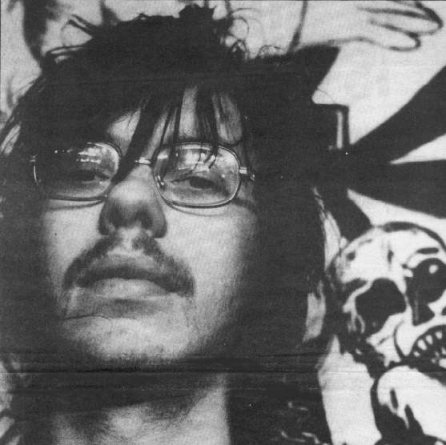

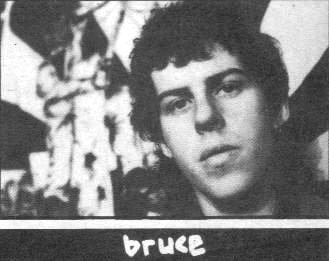
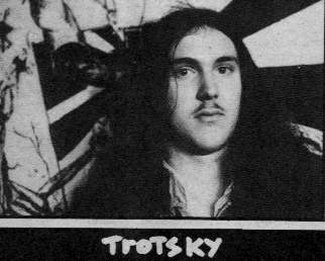
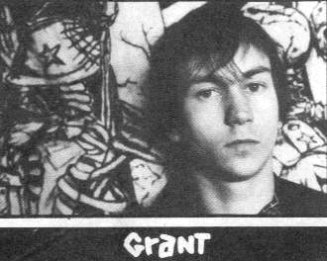
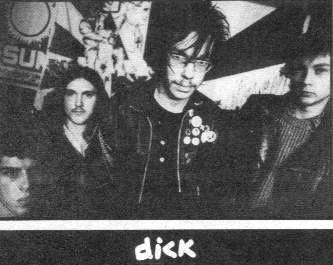
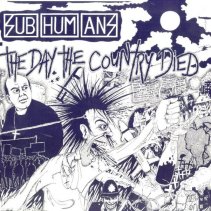
THE SUBHUMANS
'The Day The Country Died'
(Spiderleg SDL9) ****1/2
TO BURDEN the Subhumans with that decaying and
decidedly unattractive label 'punk' could, for both the
band and many others, prove to be a fatal mistake. But: If
'punk' is indeed what the Subhumans would profess to be
and if 'punk' to
You-Know-Who or anybody else) means in any way
thrills, humour, sensitivity, humanity, surprises,
individuality and some of the very best rock music ever
made, then punk is well and truly alive . . .and living in
Warminster. Correction: Make that thriving in Warminster.
It's their constant quest for variety and a brazen
unwillingness to conform with usual punk processes that
makes the Subhumans so special. No lightning album
releases here. Had they been any ordinary 1982 punk
band, 'The Day The Country Died' would no doubt have
been compulsively bunged out six months ago, hastily
recorded, badly produced, shoddily packaged and
horribly mediocre. But it wasn't and, consequently, it's
magnificent.
There are certain negative spots, however, like those
constantly recurring mnentions of "the System", the
self-depreciating, pointless "fucks" plus, of course, this
excessive
dwelling on a nightmare post-holocaust society. Trouble
is, the Subhumans sound so proud, so plain bloody
marvellous, that problems as minor as these simply don't
matter: Just listen. With each track fusing stylishly into the
next (no time to breathe!), our lust for invention and
unashamed drama is fulfilled. The quite dazzling
guitarwork of Bruce could be the key or, just as easily, it
might be Dick's grating, screaming, wonderfully emotive
voice. Perhaps Grant's evocative bass-lines are the
secret, or maybe it's that disciplined powerhouse
drumming of Trotsky's. There certainly is an air of Rock
Grandeur about the whole thing (where Trot's Led
Zeppelin leanings may well show their influence) but that's
most definitely not a criticism. 'Subvert City', 'Dying
World', 'No', 'Zyklon B Movie', 'No More Gigs' and the epic
'Black & White' all have the class and emotional power to
appeal to everyone from Friday Rockshow headbangers
to. . .who knows?
The Subhumans are getting away with, and revelling in,
songs about 'Mickey Mouse' and (horrors!) the sheer
misery of being in love. They're also getting away with
playing stunning
guitar-solos, wearing strange trousers and taking time
and immense care over everything they release. (Search
out this record's sleeve for just one example.) The
Subhumans continue to smash barriers, break rules and,
in just one year, they've put out no less than three classic
EPs. 'The Day The Country Died', is flawed enough
(including a slight yet
disconcerting reliance on basic thrash) to allow the
follow-up to emerge as an ultimate LP; a bonafide
'indispensable' five-star masterpiece. The potential is
here.
WINSTON SMITH
(SOUNDS) JANUARY 8TH 1983)
'The Day The Country Died'
(Spiderleg SDL9) ****1/2
TO BURDEN the Subhumans with that decaying and
decidedly unattractive label 'punk' could, for both the
band and many others, prove to be a fatal mistake. But: If
'punk' is indeed what the Subhumans would profess to be
and if 'punk' to
You-Know-Who or anybody else) means in any way
thrills, humour, sensitivity, humanity, surprises,
individuality and some of the very best rock music ever
made, then punk is well and truly alive . . .and living in
Warminster. Correction: Make that thriving in Warminster.
It's their constant quest for variety and a brazen
unwillingness to conform with usual punk processes that
makes the Subhumans so special. No lightning album
releases here. Had they been any ordinary 1982 punk
band, 'The Day The Country Died' would no doubt have
been compulsively bunged out six months ago, hastily
recorded, badly produced, shoddily packaged and
horribly mediocre. But it wasn't and, consequently, it's
magnificent.
There are certain negative spots, however, like those
constantly recurring mnentions of "the System", the
self-depreciating, pointless "fucks" plus, of course, this
excessive
dwelling on a nightmare post-holocaust society. Trouble
is, the Subhumans sound so proud, so plain bloody
marvellous, that problems as minor as these simply don't
matter: Just listen. With each track fusing stylishly into the
next (no time to breathe!), our lust for invention and
unashamed drama is fulfilled. The quite dazzling
guitarwork of Bruce could be the key or, just as easily, it
might be Dick's grating, screaming, wonderfully emotive
voice. Perhaps Grant's evocative bass-lines are the
secret, or maybe it's that disciplined powerhouse
drumming of Trotsky's. There certainly is an air of Rock
Grandeur about the whole thing (where Trot's Led
Zeppelin leanings may well show their influence) but that's
most definitely not a criticism. 'Subvert City', 'Dying
World', 'No', 'Zyklon B Movie', 'No More Gigs' and the epic
'Black & White' all have the class and emotional power to
appeal to everyone from Friday Rockshow headbangers
to. . .who knows?
The Subhumans are getting away with, and revelling in,
songs about 'Mickey Mouse' and (horrors!) the sheer
misery of being in love. They're also getting away with
playing stunning
guitar-solos, wearing strange trousers and taking time
and immense care over everything they release. (Search
out this record's sleeve for just one example.) The
Subhumans continue to smash barriers, break rules and,
in just one year, they've put out no less than three classic
EPs. 'The Day The Country Died', is flawed enough
(including a slight yet
disconcerting reliance on basic thrash) to allow the
follow-up to emerge as an ultimate LP; a bonafide
'indispensable' five-star masterpiece. The potential is
here.
WINSTON SMITH
(SOUNDS) JANUARY 8TH 1983)


